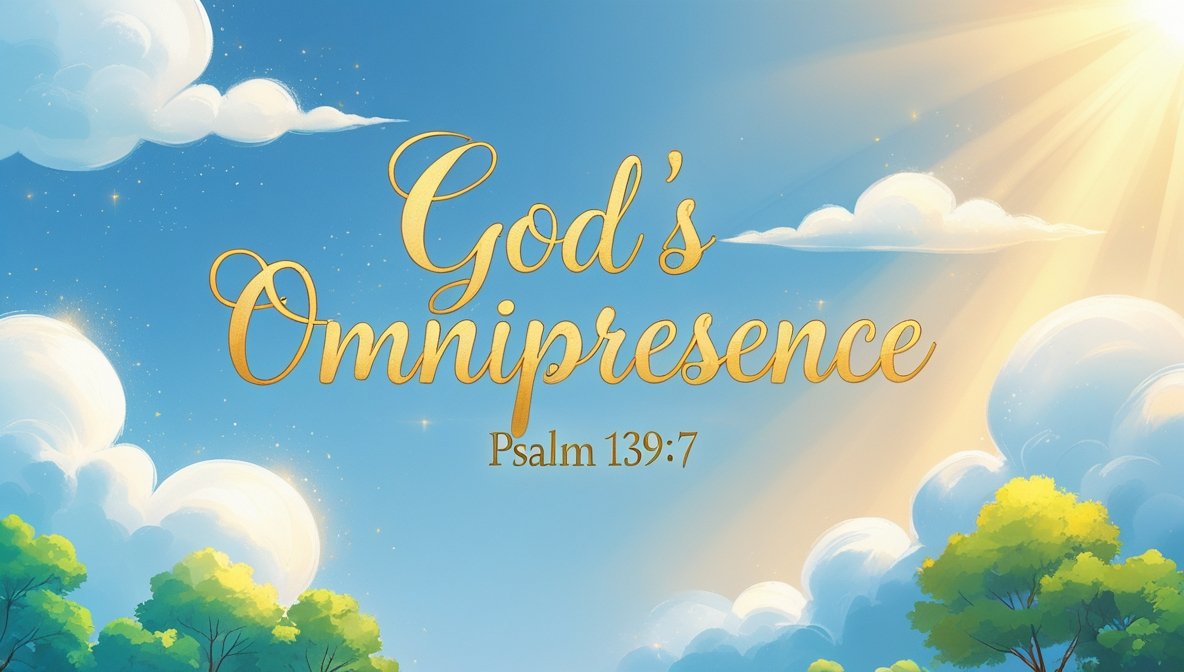God Is Ever-Present (Omnipresent) – Psalm 139:7
When you read the Bible and hear the phrase “God is everywhere,” your heart may feel both reassured and puzzled. That very tension—comfort because God is near, puzzlement because how can God be everywhere at once?—is at the heart of Psalm 139:7. The psalmist David asks the searching question, “Where can I go from your Spirit? Where can I flee from your presence?” and then answers for you, and for all who listen, that there is nowhere you can go where God is not already present. See the passage for yourself: Psalm 139:7.
This article is written for you—if you’ve ever felt alone, fearful, comforted, or curious about who God is. I want to walk with you through Scripture and through plain, compassionate words to explore what God’s omnipresence means, why it matters to your daily life, how it intersects with other divine attributes, and how you can live with a steady awareness of God’s presence. You’ll find Bible references to guide you further, each linked so you can read the verses in context on Bible Gateway.
What does “omnipresent” mean?
To say God is omnipresent is to say God is present everywhere at all times. It doesn’t mean God is limited by space or bound to one corner of the universe. The Bible uses images and language to make that truth both intelligible and personal. In the opening verses of Psalm 139, David reflects on the way God knows him intimately—his thoughts, his words, his ways—and then moves to the realization that God’s presence is inescapable: “Where can I go from your Spirit?” Read the fuller context here: Psalm 139:1-6 and Psalm 139:7-12.
Omnipresence is not a cold doctrine. In Scripture, God’s being everywhere is connected with his care, his watchfulness, and his nearness to the suffering and the humble. Jeremiah reminds you that God is not far off: “Am I only a God nearby,” the Lord asks, “and not a God far away? Who can hide in secret places so that I cannot see them?” See that promise here: Jeremiah 23:23-24. The point is simple and profound: God’s presence is not theoretical. It is personal and practical for your life.
The landscape of Psalm 139: David’s honest search
David’s Psalm is an honest spiritual exploration that begins with praise for God’s intimate knowledge and ends with a plea for sanctifying care. He speaks as someone who knows his failures and feels vulnerable, yet trusts in a God whose knowledge and presence are a comfort. Read more of the Psalm to see how his heart moves from wonder to prayer: Psalm 139:13-18. The entire Psalm shows you a God who is personal, involved, and close—someone who formed you and knows even the hidden pathways of your life.
David’s words aren’t meant to be an abstract theology lesson. They’re his honest, intimate conversation with God. He models for you how to bring your whole self—your doubts, fears, joys—into God’s presence, knowing that God is already there and knows you fully.
Why God’s omnipresence matters to you
The truth that God is ever-present reshapes how you live. It changes everything from your moments of loneliness to your decisions in secret, your sufferings, and your joys. This is not just metaphysical information; it is pastoral truth meant to steady your heart.
When you feel abandoned or isolated, you are not alone. Jesus promised his followers, “And surely I am with you always, to the very end of the age.” Read those words and let them sink in: Matthew 28:20. The presence of Jesus—God with you—means your life has divine company every step of the way. Hebrews echoes this promise of unfailing presence: “I will never leave you nor forsake you.” Hebrews 13:5. These assurances are meant to comfort you when life is hard and to guide you when life is confusing.
God’s presence also shapes your sense of responsibility. If God is with you everywhere, then your private life is not unknown to God. That’s not an accusation but an invitation to authenticity and integrity. David’s prayer near the end of Psalm 139—“Search me, God, and know my heart” (Psalm 139:23-24)—is an example of how God’s nearness invites you into a deeper, purer life.
God’s presence in suffering and loss
When sorrow crushes you, it can seem as though God is silent or far away. Yet Scripture repeatedly shows that God is present in the valley. David’s famous reflection, “Even though I walk through the valley of the shadow of death, I will fear no evil, for you are with me,” pictures a shepherd who walks beside you in the darkest places: Psalm 23:4. That image is not sentimental; it’s a profound pastoral truth: the presence of God does not always remove your pain, but it gives you a companion in it.
God’s presence is also a promise of comfort and strength. “God is our refuge and strength, an ever-present help in trouble,” the psalmist declares. Let those words in Psalm 46 be your anchor when storms rage: Psalm 46:1. And Paul reminds you that nothing—neither death nor life, nor anything in all creation—can separate you from the love of God in Christ Jesus: Romans 8:38-39. You are held by a love that is present and unbreakable.
Omnipresence and other attributes of God
God’s omnipresence does not stand alone; it fits within the broader tapestry of divine attributes—omniscience (God knows all), omnipotence (God is all-powerful), holiness, and sovereignty. These attributes together reveal a God who is both infinitely greater than you and intimately near you.
Consider omniscience: if God is everywhere, God knows all that happens in every place. David says this explicitly when he speaks of God’s searching knowledge of his thoughts and words: Psalm 139:1-4. Omnipotence flows naturally from omnipresence when you see that nothing is outside God’s domain—yet that power is exercised in love and justice. Scripture points to God’s sustaining power in creation: “For in him all things were created… and in him all things hold together.” Read this truth in Colossians: Colossians 1:16-17.
Sovereignty and presence mean that God is actively at work in history and in your life. He is not a distant force; he is the living God, present and engaged. That engagement is why your prayers matter and why your response to God matters.
Common misunderstandings about God’s presence
You may hear wrong ideas about omnipresence—ideas that can confuse or even harm your faith. One common error is pantheism: the belief that God is identical with creation, so everything is God. The Bible does not teach that. When Scripture speaks of God’s presence, it also affirms God’s transcendence—God is above creation and not simply reducible to it. Paul tells you that “the God who made the world and everything in it is the Lord of heaven and earth… he is not served by human hands,” emphasizing God’s distinction from creation: Acts 17:24-25.
At the same time, Scripture affirms God’s closeness and sustaining power. The Creator remains distinct from the created reality, yet he is present with and involved in it. That balance—transcendence and immanence—is a biblical tension you can hold without anxiety, trusting that God is both holy and tender.

How can you experience God’s presence
Experiencing God’s presence is both simple and profound. It doesn’t always involve dramatic emotions, but it often involves practiced habits that open your heart to the reality Scripture declares.
- Draw near to God in prayer. James offers you a direct invitation: “Come near to God and he will come near to you.” (James 4:8). Prayer is not a ritual; it’s the pathway of relationship. When you speak honestly to God, you are entering into the presence you already have in Christ.
- Be present in Scripture. The Bible is where God communicates his character and promises. The apostle Paul affirms the power and usefulness of Scripture for teaching and training you in righteousness: 2 Timothy 3:16-17. Reading Scripture shifts your eyes from circumstances to God.
- Practice stillness and attentiveness. In a noisy age, God often speaks in the quiet: “Be still, and know that I am God.” (Psalm 46:10). Stillness is not passive; it’s an active discipline of waiting and listening.
- Lean into Christian community. God’s presence is mediated through people too. When you gather with others in worship and service, God’s nearness is often felt through shared prayer, singing, and mutual care.
- Remember God’s promises. Rehearse them when fear rises. Jesus’ promise to be with you always is a lifeline: Matthew 28:20. The memory of these promises helps you sense God’s presence even when emotions are flat.
Prayer, meditation, and the practice of presence
Prayer is the primary way you cultivate awareness of God’s presence. It’s not about perfect words but about an open heart. Paul encourages you to bring everything to God: your anxieties, your gratitude, your requests. He promises that God’s peace will guard your heart and mind: Philippians 4:6-7. When you pray with this openness, you make space to experience God’s nearness.
Meditation on Scripture—slowly reading and reflecting on a verse—is another practice that roots you in God’s word and presence. Psalm 16:11 offers you a picture of fullness in God’s presence: “You make known to me the path of life; you will fill me with joy in your presence.” (Psalm 16:11). Let that promise guide your reading and quiet reflection.
Journaling your prayers and observations can also help. When you write down how you sense God’s leading, you create a record of God’s faithfulness that strengthens you in seasons of doubt.
Living responsibly in God’s presence
Belief in God’s omnipresence carries a moral call. If God is with you in private as well as public, then your character matters in both realms. David’s plea, “Search me, God, and know my heart,” shows humility before God’s presence: Psalm 139:23-24. This is not about legalism but about transformation—allowing the God who is near to shape your life.
When you recognize God’s presence, you’ll find your moral life is not a burdensome rule-keeping but a grateful response to the One who loves you and knows you. The presence of God awakens in you a desire for holiness out of affection, not fear alone.
God’s presence and eternity: death, hope, and the promise to be with you
When you face death—your own or the loss of a loved one—the reality of God’s presence is the deepest source of hope. Jesus promised that he goes to prepare a place and that he will come again to receive you to himself: John 14:2-3. Revelation gives a final picture of God dwelling with his people, wiping every tear from their eyes: Revelation 21:3-4. These promises are not mere consolations; they are the foundation of your hope in the face of mortality.
Even now, God’s presence shapes how you grieve and how you hope. You do not grieve as those without hope, because God is personally present in sorrow and will ultimately make all things new.
Responding to God’s presence: confession, repentance, and faith
If God is near and knows your heart, how should you respond? David gives a model for you: invite God’s searching, ask for correction, and follow God’s ways. That honest openness leads to growth. Scripture invites you to repent—to turn from that which separates you from God—and to receive God’s mercy.
The New Testament makes clear that reconciliation with God comes through faith in Christ. Romans offers the plain way of salvation: if you confess with your mouth that Jesus is Lord and believe that God raised him from the dead, you will be saved. That is the gospel call to you: Romans 10:9-10. Because God is omnipresent, when you turn to Christ in faith, you enter into the most intimate possible relationship with God—a relationship that is always present and always sustaining.
Stories of presence: how believers describe God’s nearness
You may find encouragement in the stories of everyday believers who have felt God’s presence in times of fear, despair, or decision. A mother praying by a hospital bed, a man sensing a sudden calm amid a storm, a teenager opening Scripture and finding a verse that pierces a lonely heart—these are ordinary manifestations of the profound truth that God is with you.
These accounts are not magical thinking; they are the lived experience of God’s presence in real human lives. Scripture gives you a rich vocabulary for these experiences: comforter, shepherd, counselor, ever-present help. Let those images form your expectations so that you look for God not only in grand signs but also in quiet, sustaining companionship.
Practical steps to maintain awareness of God’s presence
You won’t always feel the presence of God, and that’s normal. Feelings come and go. But you can take practical steps to cultivate a steady awareness:
- Begin your day with Scripture and a short prayer, asking God to be present with you through your tasks.
- Use simple reminders—an alarm that prompts a brief prayer, a verse on a note in your pocket, or songs that focus your heart on God during the day.
- Practice regular confession and repentance so that guilt does not become a barrier to sensing God’s nearness.
- Join a small group or regular worship service so that God’s presence is reinforced through community and the sacraments.
- Be intentional about silence and solitude. Even five to ten minutes of stillness can reorient you toward God.
Each of these practices is not a formula for mystical experiences but disciplines that open your heart to the reality Scripture promises. When you cultivate them, you’re not manufacturing God’s presence—you are positioning yourself to recognize and receive the presence God freely gives.

The pastor’s encouragement: You are not alone
If you are weary, grieved, or burdened, take heart from the Scriptures: God is with you. The great comforts of the Bible are not abstract propositions but personal promises meant for you. Hebrews reminds you of God’s faithful presence: “I will never leave you nor forsake you.” (Hebrews 13:5). When you feel forsaken, remind yourself of these words and bring your sorrow to the One who is present.
The Christian life is not a solitary journey. God’s presence accompanies you, and the community of faith surrounds you. Allow others to pray with you, to carry your burdens, to remind you of God’s promises when your vision is clouded.
Conclusion: live in the light of God’s presence
God’s omnipresence is not an abstract doctrine to be archived in your mind but a living reality to shape your day. Psalm 139:7-12 leads you into a heart-deep realization: there is nowhere you can go where God is not. That realization brings comfort in loneliness, courage in trials, conviction in sin, and hope in death. Read the heart of the Psalm again and let it speak to your life: Psalm 139:7-12.
If you don’t yet know the intimacy of God, the gospel invites you. Confess your need, trust in Christ’s saving work, and step into the presence of the God who knows you and loves you. Romans explains how faith opens you into that relationship of life and presence: Romans 10:9-10.
Remember: because God is omnipresent, you never walk alone. Your prayers are heard, your tears are seen, and your joys are shared by the God who is with you always.
Explore More
For further reading and encouragement, check out these posts:
👉 7 Bible Verses About Faith in Hard Times
👉 Job’s Faith: What We Can Learn From His Trials
👉 How To Trust God When Everything Falls Apart
👉 Why God Allows Suffering – A Biblical Perspective
👉 Faith Over Fear: How To Stand Strong In Uncertain Seasons
👉 How To Encourage Someone Struggling With Their Faith
👉 5 Prayers for Strength When You’re Feeling Weak

📘 Jesus and the Woman Caught in Adultery – Grace and Mercy Over Judgement
A powerful retelling of John 8:1-11. This book brings to life the depth of forgiveness, mercy, and God’s unwavering love.
👉 Check it now on Amazon
As a ClickBank & Amazon Affiliate, I earn from qualifying purchases.
Acknowledgment: All Bible verses referenced in this article were accessed via Bible Gateway (or Bible Hub).
“Want to explore more? Check out our latest post on Why Jesus? and discover the life-changing truth of the Gospel!”








